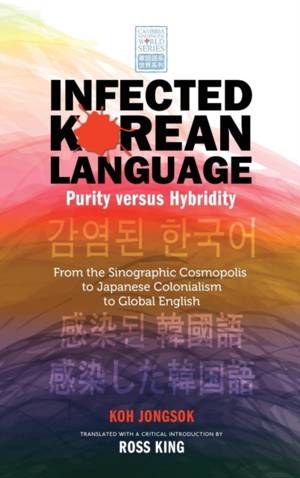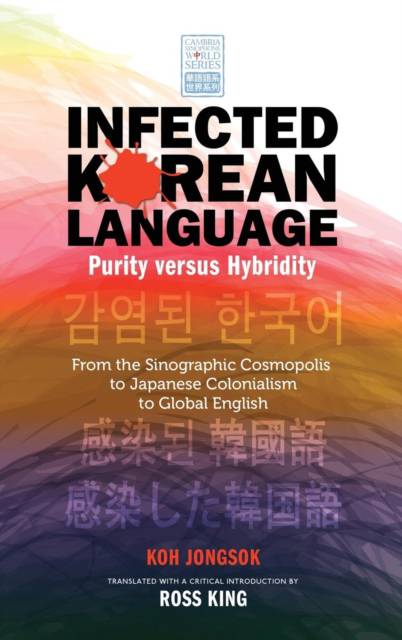
- Retrait gratuit dans votre magasin Club
- 7.000.000 titres dans notre catalogue
- Payer en toute sécurité
- Toujours un magasin près de chez vous
- Retrait gratuit dans votre magasin Club
- 7.000.0000 titres dans notre catalogue
- Payer en toute sécurité
- Toujours un magasin près de chez vous
Infected Korean Language, Purity Versus Hybridity
From the Sinographic Cosmopolis to Japanese Colonialism to Global English
Jongsok Koh
156,45 €
+ 312 points
Description
This book is in the Cambria Sinophone World Series (General Editor: Victor H. Mair). Although numerous book-length studies of language and modernity in China and Japan can be found even in English, little has been written in any language on the question of linguistic modernity in Korea. Infected Korean Language, Purity Versus Hybridity by noted journalist and writer Koh Jongsok is a collection of critical essays about Korean language and writing situated at the nexus of modern Korean history, politics, linguistics, and literature. In addition to his journalistic and writing experience, Koh also happens to have a keen interest in language and linguistics, and he has received postgraduate training at the highest level in these subjects at the Sorbonne. This book bears witness to the trials and tribulations-historical, technical and epistemological-by which the Korean language achieved "linguistic modernity" under trying colonial and neo-colonial circumstances. In particular, Koh tackles questions of language ideology and language policy, modern terminology formation, and inscriptional practices (especially the highly politicized questions of vernacular script versus Chinese characters, and of orthography) in an informed and sensitive way. The value of Koh's essays lies in the fact that so little has been written in a critical and politically progressive vein-whether scholarly or otherwise-about the processes whereby traditional Korean inscriptional and linguistic practices became "modern". Indeed, the one group of academics from whom one would expect assistance in this regard, the "national language studies" scholars in Korea, have been so blinkered by their nationalist proclivities as to produce little of interest in this regard. Koh, by contrast, is one of precious few concerned and engaged public intellectuals and creative writers writing on this topic in an easily understandable way. Little or nothing is available in English about modern Korean language ideologies and linguistic politics. This book analyzes the linguistic legacies of the traditional Sinographic Cosmopolis and modern Japanese colonialism and shows how these have been further complicated by the continued and ever-more hegemonic presence of English in post-Liberation Korean linguistic life. It exposes and critiques the ways in which the Korean situation is rendered even more complex by the fact that all these issues have been debated in Korea in an intellectual environment dominated by deeply conservative and racialized notions of "purity", minjok (ethno-nation) and kugo or "national language" (itself an ideological formation owing in large part to Korea's experience with Japan). Koh sheds light on topics like: linguistic modernity and the problem of dictionaries and terminology; Korean language purism and the quest for "pure Korean" on the part of Korean linguistic nationalists; the beginnings of literary Korean in translation and the question of "translationese" in Korean literature; the question of the boundaries of "Korean literature" (if an eighteenth-century Korean intellectual writes a work of fiction in Classical Chinese, is it "Korean literature"?); the vexed issue of the "genetic affiliation" of Korean and the problems with searches for linguistic "bloodlines"; the frequent conflation of language and writing (i.e., of Korean and han'gul) in Korea; the English-as-Official-Language debate in South Korea; the relationship between han'gul and Chinese characters; etc. This book will be of value to those with an interest in language and history in East Asian in general, as well twentieth-century Korean language, literature, politics and history, in particular. The book will be an unprecedented and invaluable resource for students of modern Korean language and literature.
Spécifications
Parties prenantes
- Auteur(s) :
- Traducteur(s):
- Editeur:
Contenu
- Nombre de pages :
- 326
- Langue:
- Anglais
- Collection :
Caractéristiques
- EAN:
- 9781604978711
- Date de parution :
- 28-01-14
- Format:
- Livre relié
- Format numérique:
- Genaaid
- Dimensions :
- 152 mm x 229 mm
- Poids :
- 648 g

Les avis
Nous publions uniquement les avis qui respectent les conditions requises. Consultez nos conditions pour les avis.






